
Entirely off-grid and unattached to the mainland by so much as a cable or pipe, Lambay (630 acres) is partially run on green energy generated by solar panels and a wind turbine that are rigged up to a complex battery system. While the turbine and panels produce more than enough energy to run the entire island, we are thwarted by the storage system, which is unable to hold all the energy produced.
Throughout 2015 and 2016 we revamped the entire energy system, allowing it to extend to more buildings on the island. The ultimate goal is to get it to a level where it will generate and store enough power to sustain the entire island on renewable energy.
Lambay also has its very own natural water source, the Trinity Well, which provides us with beautifully fresh volcanic spring water the year round for drinking, washing, cooking and bathing. This is now also used to create our very own Lambay Whiskey.
NATURAL HISTORY
Lambay is internationally important (and a Natura 2000 site) for its breeding seabirds and is home to the largest breeding colony of North Atlantic Grey Seals on the east coast of Ireland. It also holds a remarkable place in European natural history as the site of a pioneering biological investigation undertaken by the naturalist Robert Lloyd Praeger in 1906. They even found some entirely new species including three earthworms, a bristletail and a mite!

Lambay Farm: Sustainable & Organic Practices
The farm on Lambay has been running since before Cecil and Maude Baring bought the island in 1904, but the only information we currently have on record comes from within the family. Daphne, their eldest daughter, reminisces in I Remember, I Remember about her mother Maude churning the fresh milk into butter and making "island cheese" with Kathleen Cashman, who came from Killarney to work on Lambay as a dairymaid, housemaid and cook and whose striking portrait by Maude still hangs in the Castle hallway outside the kitchen.
At some point during their son Rupert's "reign", there was a conversion from dairy to beef cattle and the "Lambay black face" sheep were removed as the number of staff on the island dwindled throughout the late 20th Century. By the time of Rupert's death in 1994, Lambay's farming activity was greatly reduced, although the next two decades saw a revival of the cattle herd.
Today, as we look at the long-term future of Lambay and ways of introducing modern, regenerative farming techniques to further protect the island, we have reduced the cattle herd and Lambay has seen the return of a large sheep flock along with a Lambay shepherd. In the Spring the island lives up to its name in full force, with guests being enchanted by the frolicking lambs.


Our Welsh Lleyn sheep are bred for their delicious meat and share the land harmoniously with our resident deer, wallabies, rabbits and seabirds. We take pride in practising farming as organically as is safely possible on an island; all the animals have a free range life, eating the fresh sea-salt grass and natural meadow vegetation across the island. We also have a few chickens for fresh, free range eggs.
Our farm meat, along side venison from the island's fallow deer, is distributed through a local meat company in County Dublin, and can be found in some of the area's Michelin star restaurants, as well as having featured on Aer Lingus' first class in-flight menu. Kerrigan's Butcher in Malahide sells delicious Lambay meat boxes at certain times of year.
On the island we keep aside a small portion of the meats including fresh wallaby (as they have no natural predators on the island, we must cull them annually along with the deer to keep them healthy) for the family and special guests. This is often complimented perfectly with delicious natural produce foraged from the shoreline, the gardens and further afield.

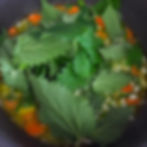


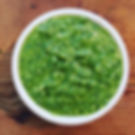
Lambay's Eco-System
By its very nature as an island, Lambay has a unique eco-system and microclimate that remains independent of the mainland. Visitors and guests are quick to note the proliferation of bees and butterflies of all shapes and colours, who thrive thanks to a lack of pollution, disturbance and an abundance of flora and natural habitat.
The Barings are committed to protecting and maintaining this precious eco-system not only for the flora and fauna, but also as a place where sustainable living and sustainable practices are prevalent, reminding us to slow down and live in a responsible and healthy manner.
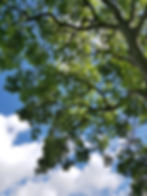

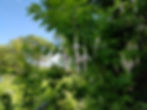

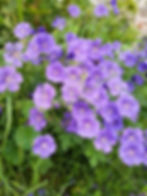
FOOD
From production through to waste, island life requires more thought to go into our behaviour when it comes to consumption. Starting on the production level, we practise organic farming on Lambay - ensuring our animals have a natural, free-range lifestyle and with minimum medical intervention.
Island residents make a weekly only food order, which comes over on the boat, so planning and imagination is required to ensure there is minimal waste without then running out of food by the end of the week! Where time permits we make our own bread and we use home grown herbs in our cooking and foraged plants for our salads.
The walled kitchen garden moves between various states of repair and productivity depending on who is on the island to help. Some years we can grow the majority of our own fresh produce, saving on unnecessary packaging being brought over from the mainland. Other years we have to rely on help from the mainland producers but subsidise where we can with island herbs, salads, garnishes, flowers and fruit; seaweeds, wild mussels and clams; or fresh wallaby meat for stews and mince!
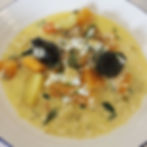
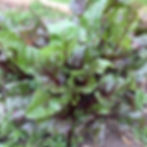


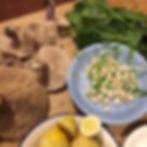
COMPOST & RECYCLING
Another reason for limiting what we bring over from the mainland is the packaging - everything on Lambay must be recycled or composted, and there is limited space for storage. What cannot be recycled must eventually be returned to the mainland, so we keep this to a minimum.
Throughout 2016 we invested in a glass crusher and another for plastics and metals. Each kitchen on Lambay has an organised waste system, with separate compartments for Tins/Cans, Plastics, Glass, Paper/Card and Skip Waste. For food we have Compost and Cooked Waste, the former going onto our composting heaps and the latter going to the chickens, birds and the lobsters.
ENERGY CONSUMPTION
The first wine turbine was installed on Lambay as far back as the 1980's. We have since added solar panels and in 2016 we updated the equipment to a far more efficient system which now powers the Castle hot water and heating, as well as the entire island's electricity.
Off-grid living requires a responsible attitude towards energy consumption; what cannot be provided by the wine turbine and solar panels must be shipped over from the mainland at great expense and requiring complex logistics and manpower. While we already generate enough renewable energy to power the whole island, our current system has a limit on how much energy it can store. As a result, we are still reliant on oil burners and coal to heat some of the shoreline buildings until such a time that we are able to upgrade the entire system to a more powerful one.
We must also be conscientious with our water consumption; while there is an unlimited supply during the winter months, a particularly dry summer can cause our spring levels to drop considerably. This has been much improved by our present reservoir system, which was upgraded to store and collect island water for our Lambay Whiskey.



SUSTAINABLE ISLAND LIVING
There are few places left in the modern world that provide a community with an environment which requires each person to think carefully and responsibly about sustainable practices on a day-to-day basis. Here on Lambay, we consider it a blessing as it reminds us to be grateful for everything we have, and to be imaginative with the resources available to us. Sometimes that may mean concocting an unusual meal with whatever is left in the cupboard the night before the next food order is due to arrive; or rigging an automatic lighting system that will ensure lights are not left on unnecessarily by guests; or planning the washing loads to use minimal off-grid power. Other times it means putting down the phones, the iPads and the laptops to read a book by the fire, play a game or simply enjoy the freedom of a long walk in the unspoiled natural habitat of the island.
Our ethos is to share this unique world with the bold and the bright who find themselves drawn to Lambay despite the non-stop pace of their "mainland" lives. The aim is to remind successful and driven individuals that slowing down for a short time can enhance their productivity no end; by immersing themselves in a world of nature that taps into a different part of their brains, brilliant people can form sustainable personal and business relationships that lead to new and exciting projects, based on a truer sense of a responsible and sustainable lifestyle going forwards.
